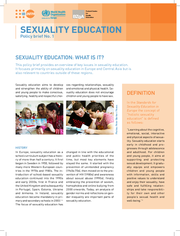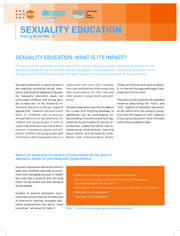ISTANBUL – The United Nations Population Fund (UNFPA Regional Office for Eastern Europe and Central Asia), the Federal Centre for Health Education (BZgA) in Germany, and the World Health Organization (WHO Regional Office for Europe) are jointly developing a series of policy briefs on sexuality education.
The first two issues have now been released and answer the questions:
- What is sexuality education?
- And what is the impact of sexuality education?
The policy briefs are targeted to politicians and other decision-makers, primarily in Europe and Central Asia, and provide them with comprehensive information on different issues regarding sexuality education. As an advocacy tool, the policy briefs promote good-quality sexuality education as an effective life-course intervention which supports children and young people in protecting their sexual health and general well-being.
Policy brief No. 1 provides background information on the history, the benefits and the rights-based approach of sexuality education and further discusses myths and facts in this field. It argues that children and young people can greatly benefit from good-quality sexuality education which is age- and development appropriate.
Policy brief No. 2 summarizes the scientific evidence regarding the impact of sexuality education on the sexual health and well-being of children and young people. In this regard, it explores public-health-related indicators such as the reduction of HIV and other sexually transmitted infections, but also so-called “soft outcomes” of sexuality education, such as the development of a positive attitude towards sexuality as well as skills in communication, decision-making and critical thinking.
Both policy briefs are available for download:
 |
 |
And hard copies can be ordered from BZgA's website.


